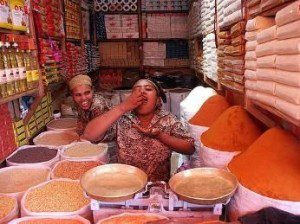Logistics in Africa is tough. Africa just does not have the infrastructure, has an education gap, and does not widely deploy technologies like GPS tracking that are common in the West. But add to that the Ebola plague, insurgent groups like Boku Haram, corruption, and instable government regimes, and you have what appears to be a risk management nightmare.
But if you are consumer goods multinational, you can’t ignore the rewards. Growth in Western nations for your products will be limited. The populations are aging, the economies are growing slowly, and the markets are mature.
In contrast, billionaire Investor George Soros has described Africa as “one of the few bright spots on the gloomy global economic horizon” with one the fastest growing middle class in the world.
So, consumer goods companies would be foolish to not push aggressively into Africa. Africa and Asia are their future. But how does a CPG company navigate the supply chain risks?
The simple answer is that it comes down to risk versus reward. The safe way, particularly in the initial stages of market penetration, is to outsource logistics or even distribution to local companies.
And there are some big distributors and 3PLs that you can work with. I talked to Cobus Rossouw, the Chief Business Development Officer at Imperial Logistics, about this. Despite its name, the South African headquartered Imperial Logistics generates a large portion of its $9 billion in annual revenues from acting as a distributor rather than as a third party logistics (3PL) company.
One point Cobus made is that working with a knowledgeable local expert can get you the domain expertise you need in an extremely heterogeneous operating environment. Africa has 55 nations, 2,500 languages, and over one billion consumers. The cultural practices differ from nation to another, and often from town to town. And the risks of working in southern Nigeria, are not the same as you would see in Northern Nigeria where Boku Haram is active.
While Imperial Logistics fully understands the operational intricacies of operating in South Africa, South Africa is not Ghana, it is not Mozambique, and it is not Nigeria. Imperial Logistics itself partners with local champions in the African nations in which it operates. The partnerships often take the form of an equity stake in the partner companies.
Cobus also made the point that it may make more sense to work with a distributor than a 3PL. A distributor takes ownership of the goods. In a continent with poor logistics, this means that as a distributor they can offset the delivery uncertainties by storing appropriate inventory. And because Imperial Logistics as a distributor has a stake in the success of the brand, Imperial wants to place its bets in the cities and regions that offer the best ROI opportunities.
Further, working with a distributor has one more advantage. In the West, the retailers have mature supply chain capabilities and much of the inventory that ends up on store shelves flows through their distribution centers.
In Africa, distribution expertise needs to encompass Western style stores, as well as Africa’s complex, but increasingly important, informal markets. These stores can be in open air markets or they might be tiny store fronts on crowded streets. In the West, direct store deliveries make up a small portion of what is delivered to most retailers. In Africa, the distributor business model, which includes sales and deliveries to these small stores, are much more important.
In Africa, Consumer Goods Companies Can’t Ignore Informal Markets
But large consumer goods companies that want to grow market share rapidly often choose to grow their local logistics infrastructure. While partnering is a good way to get started, these companies have decided that to truly ramp up market share or improve margins, they need control.
Procter & Gamble has two facilities in Ibadan‚ Nigeria‚ and is building a manufacturing plant in Lagos, as well as multi-category manufacturing plant in South Africa which they will use as a base to export from to other Southern and Eastern African nations.
Unilever has a multiyear, 75 million pound investment plan across South Africa, Nigeria, Ghana, Côte D’Ivoire, Kenya and Zimbabwe.
Diageo has revamped their supply chain organization. They went from a global organization with African supply chain managers reporting into a global supply and global procurement organization, to an organization where Africa takes responsibility for their indigenous supply chains.
But trade barriers between African countries remain one of the biggest challenges in creating a sustainable brand on the continent. In a report examining the barriers that stifle cross-border trade within the continent‚ the World Bank revealed that Africa’s largest retailer, Shoprite, spends a hefty $20‚000 a week on import permits to transport goods to its stores in Zambia alone.
“For all countries it operates in‚ approximately 100 single-entry import permits are applied for every week; this can rise up to 300 per week in peak periods. As a result of these and other requirements‚ there can be up to 1‚600 documents accompanying each truck Shoprite sends with a load that crosses a border in the region‚” the World Bank stated. Other risks in the rest of Africa include the lack of suitable real estate and currency volatility.
In conclusion, when you read about the challenges of operating in Africa, it is easy to focus on containing risks, but too heavy a focus on risk mitigation reduces potential rewards. Africa is not an easy place to operate in, and there are few easy answers, but it is the future.



















Leave a Reply